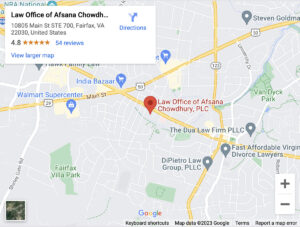Afsana Chowdhury | September 18, 2024 | Family Law

People going through a divorce that involves children are usually primarily focused on custody decisions. It is scary to think about losing access to your children, and parents want to ensure they get as much time with their kids as possible.
Dealing with custody battles is stressful and confusing. As a result, we get a lot of questions from clients about how custody decisions are made and what 50-50 custody means in Virginia.
To help answer those questions, here’s an overview of Virginia custody laws. To learn more or discuss your case, schedule a free consultation with a Fairfax divorce lawyer at the Chowdhury Divorce Law Group.
Custody Decisions in Virginia
Before discussing specific custody arrangements, it’s helpful to understand how custody decisions are made in Virginia. Under Virginia law, custody decisions are made in the best interest of the child.
With that in mind, courts prefer that parents reach an agreement on their own. After all, parents know their children and each child’s unique needs better than anyone else.
If parents cannot agree, courts will step in and make custody decisions. There are two types of custody that courts deal with: legal custody and physical custody.
- Legal custody: gives a parent the right to make decisions about a child’s non-emergency medical care, religious upbringing, and education. Legal custody can be awarded to one parent or both parents.
- Physical custody: deals with where a child spends their time. Physical custody can be awarded primarily or solely to one parent. It can also be awarded jointly. Joint, or shared custody, means that both parents have at least 90 days of custody a year.
Physical custody is usually where most disputes arise. Creating a custody agreement can be a stressful process. You’ll benefit greatly from having a good family lawyer on your side.
Factors Impacting Custody Decisions
When making custody decisions, Virginia courts are focused on creating a plan that is in the best interest of each child involved. Factors that courts use to make their decision include:
- Where the child is currently living
- Which parent has most recently been the primary caregiver
- Which parent has been the primary caregiver for most of the child’s life
- Whether each parent has stable employment
- Which parent resides in the family home
- Whether each parent can provide a stable environment
- Whether each parent is putting the child’s needs first
- The willingness of each parent to allow contact with the other parent and extended family
- Whether each parent provides a safe environment for the child
- The reasonable preference of a child who is old enough and mature enough to communicate such a preference
Based on these factors and any relevant information available, courts create a custody plan. Virginia courts can award:
- Sole custody
- Primary custody with visitation rights
- Joint or shared custody
Contact us to learn more about the factors that impact custody decisions in Virginia.
How 50-50 Custody Works in Virginia
If the court finds both parents equally fit, it will likely create a joint custody plan. Custody is considered joint or shared whenever both parents have at least 90 days of custody each year.
Pure shared custody means that each parent has physical custody of the child 50% of the time, or 182.5 days a year. With a pure 50-50 plan, time is split evenly between parents, and the child lives with each parent 50% of the time.
Some common ways courts structure 50-50 plans are:
- Spending one week at a time with each parent;
- Moving from one parent to the other mid-week;
- A 3-4-4-3 plan, where the child spends three days with one parent and then four days with the next parent. The second week, it rotates, and the child spends four days with the first parent and three days with the second parent.
Pure 50-50 arrangements are becoming increasingly popular because they provide kids with equal access to both parents. That said, they involve lots of moving and less stability for kids.
Contact The Family Law Firm of Chowdhury Divorce Law Group in Fairfax, VA
For more information, please contact an experienced family law attorney at Chowdhury Divorce Law Group to schedule an initial consultation today. Our law office is located in Fairfax, VA.
We proudly serve in Fairfax County and its surrounding areas:
Chowdhury Divorce Law Group
10805 Main St STE 700A
Fairfax, VA 22030
(703) 271-6519
Our firm is located near you. We have an office in Fairfax
Find us with our GeoCoordinates: 38.8497929, -77.3185772,3047

About The Author

Afsana Chowdhury is the founder of Chowdhury Divorce Law Group, where she is dedicated to protecting the rights of injury victims across Virginia. A George Mason University School of Law graduate, Afsana is licensed to practice in Virginia and has devoted her legal career to personal injury law. She focuses on helping clients, guiding them through divorce, custody disputes, and other complex family matters. With years of experience and a deep commitment to protecting her clients’ rights, she personally handles each case to ensure strong, focused representation.
Location: Fairfax, VA


